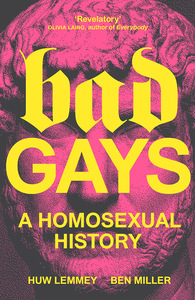You need to sign in or sign up before continuing.
Take a photo of a barcode or cover
challenging
informative
medium-paced
challenging
informative
reflective
medium-paced
informative
inspiring
reflective
slow-paced
informative
reflective
medium-paced
Rating: ⭐⭐⭐
Genre: Nonfiction
Huw Lemmey and Ben Miller's book "Bad Gays: A Homosexual History" explores the lives of fourteen bad gays, from the Hellenistic emperor Hadrian to the Far Right Dutch politician Pim Fortuyn. In the book, gay people from history who do not appeal to us or who we cannot elevate to heroic status are discussed. It examines the definitions of badness, and homosexuality, and how historically we have understood the connection between the two while creating an alternative "homosexual history" from the lives of difficult and troublesome queers.
The writers contend that too many popular histories aim to build heroes, pioneers, and martyrs while ignoring the sexualities and evil deeds of the numerous gay people who lived in the past. This definition is extremely broad. It is possibly too broad and inevitably subjective, depending on how you look at the different circumstances in each case. This book is about those people you may not have heard about. It is about those bad people who exhibited some or many traits that one could call problematic and questionable.
Since this is a work of nonfiction, I always look for the knowledge and new information it provides rather than the entertainment it may offer. The authors featured a lot of historical figures that were unfamiliar to me, and even though I was familiar with some of them, I now have a fresh perspective on them after reading about their other side. There were some of these men who were very awful and who can be categorically labeled as "bad gays," but there were also some of these men whose stories or situations were not that clear or the proof was not that significant to label them as evil people. The book's writing style is not particularly engaging, yet it does not detract from the overall experience of reading it. In general, I liked reading this book, and I am grateful to the writers for including a list of all the resources they used in case any reader is interested in learning more about the subject.
funny
informative
medium-paced
I really liked this audiobook. I wish I had a physical copy though, to revisit some things and to remember them better. But I can totally recommend it either way.
informative
slow-paced
informative
reflective
slow-paced
found chapters 6, 8, and 11 the most interesting
informative
sad
slow-paced
challenging
informative
reflective
slow-paced
I enjoyed the stories, but ultimately this book lacked a central thesis beyond how these individuals were bad players within their systems and circumstances. I think that the common thread of trading intersectionality for privilege could have been developed much more and more consistently at the end of each individual’s chapter to make the book more cohesive instead of just feeling like the podcast smashed together.
Also, as an American reader, I could have used a lot more background for the settings in other countries beyond the US and UK, such as the concept of the Dutch heterogeneous pillared tolerance culture.
Finally, it was a jarring combination of actual sociological jargon and vernacular, which I took to mean that the intended audience was supposed to be equally as on the pulse of social justice and as educated as the authors.
Also, as an American reader, I could have used a lot more background for the settings in other countries beyond the US and UK, such as the concept of the Dutch heterogeneous pillared tolerance culture.
Finally, it was a jarring combination of actual sociological jargon and vernacular, which I took to mean that the intended audience was supposed to be equally as on the pulse of social justice and as educated as the authors.


